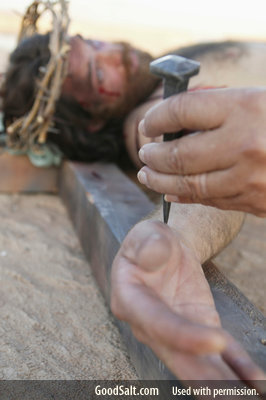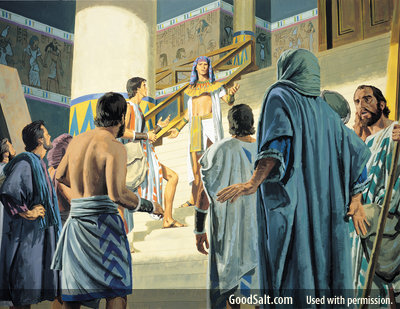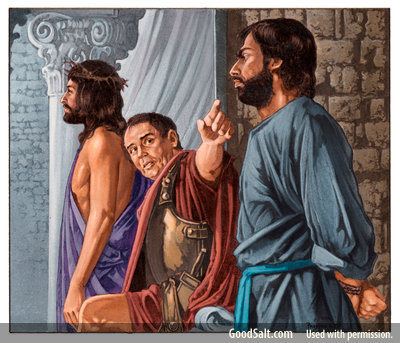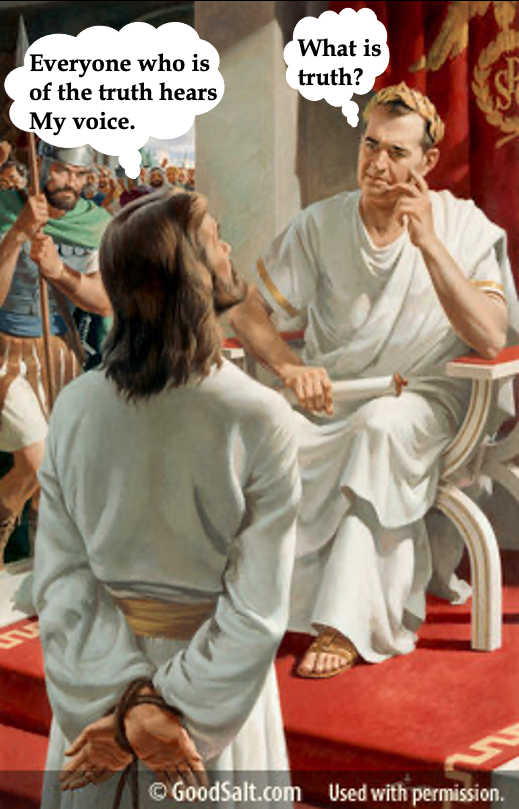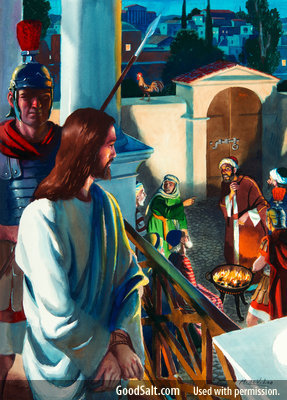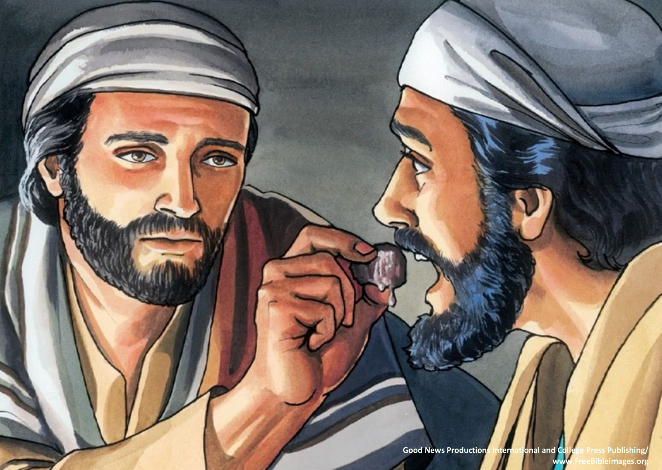“So when Jesus had received the sour wine, He said, ‘It is finished!’ And bowing His head, He gave up His spirit.” John 19:30
From the beginning of human history, people have tried to remedy their sin problem through their own efforts. When Adam and Eve sinned against God, they tried to remedy their sense of fear and shame by covering themselves with “fig leaves” (Genesis 3:7). But this covering did not remove the effects of their sin. Since that first attempt to remove the consequences of sin through human effort, people have been trying to remove their own guilt and shame through their own accomplishments. Various religions have been created by people trying to remedy their sin problem. But all man-made religions fall short of God’s solution to our sin problem.
In Genesis 3:21, God graciously provided the proper covering for Adam and Eve. He “made tunics of skin” through the death of an innocent animal. Blood must be shed. Imagine how Adam must have felt to see one of the animals he had named and cared for being killed on his account! Never had Adam and Eve known death. This was serious business and this was to be God’s way of dealing with sin throughout the ages. By providing a covering with animal skins, God provided forgiveness through the “shedding of blood” (Hebrews 9:22). God later provided forgiveness through the Old Testament sacrificial system.
Those animals were shadows of the Babe who was born on that first Christmas morning. He would be called “the Lamb of God” (John 1:29). Like that first animal that was sacrificed for Adam and Eve, Jesus Christ would also be innocent and without sin because He was and is God (John 1:1, 14, 17; 18:38; 19:4, 6; 2 Corinthians 5:21; Hebrews 4:15; I Peter 3:18). And like that first sacrificial animal, Jesus was born to die for the sins of others (John 1:29; Romans 5:8; I John 4:9), that “whoever believes in Him should not perish but have everlasting life” (John 3:16).
Like Adam and Eve, our human efforts or works cannot remove our sin and shame (Isaiah 64:6; Romans 4:5; Ephesians 2:8-9). Religion cannot take away our sins. Only Jesus Christ can take away our sins (John 14:6; Acts 4:12). Why? We will discover the answer in the next verse of our study about lasting lessons from the last day in Jesus’ life.
In this picture that John presents we learn that WE CANNOT WORK OUR WAY TO HEAVEN BECAUSE WE CANNOT PAY A DEBT THAT IS ALREADY PAID (John 19:30). The apostle John writes, “So when Jesus had received the sour wine, He said, ‘It is finished!’ ” (John 19:30a). As we saw in our last lesson, Jesus’ throat and lips had become parched from the extreme loss of bodily fluids. He shouted out in agony, “I am thirsty!” (John 19:28) to fulfillthe prophecy in Psalm 69:21 (cf. John 19:28-29) and to save us from an eternal thirst (Ecclesiastes 3:11; John 4:10, 14; 7:37-39; Revelation 22:17). John then tells us Jesus “received the sour wine” which would moisten His throat and lips to proclaim the most triumphant declaration ever made: “It is finished!” He did not say, “I am finished!” as some might think. “That would mean He died defeated. No, this was not the end for Him but the beginning of a new chapter in His eternal existence.” 1
When John writes, “And bowing His head, He gave up His spirit” (John 19:30), he is connecting us back to something Jesus said earlier. “Therefore My Father loves Me, because I lay down My life that I may take it again.No one takes it from Me, but I lay it down of Myself. I have power to lay it down, and I have power to take it again.” (John 10:17-18). The Jews or Romans did not take Jesus’ life from Him. Christ voluntarily laid down His life for the sins of the world. “Greater love has no one than this, than to lay down one’s life for his friends.” (John 15:13).
What did Jesus mean when He said “It is finished”? The Greek word that is translated “finished” is tetelestai. Receipts in New Testament times were stamped with this word which meant that the debt had been paid in full. Jesus was saying that our sin debt was paid in full! 2 Past, present, and future sins have all been paid for by the blood of the Lamb, Jesus Christ (John 1:29; Revelation 1:5; 12:11).
The Bible tells us that all people have sinned against God with their thoughts, words, and actions (Romans 3:9-23). All sin incurs a debt which the sinner owes to God (Romans 6:23a). If you and I were to pay our own sin debt to God, we would have to suffer forever in the lake of fire (Revelation 20:15). But God loves us so much that He sent His only perfect Son to die in our place on the cross. “Jesus did in six hours what no human being can do in all of eternity.” 3 When Christ died on that cross, He gathered to Himself the accumulated debt of a sinful human race and offered to God the full payment for our sins – past, present, and future. Having made the payment, Jesus could say, “It is finished!” – the debt is paid in full. Jesus “paid the very last cent of the wages of our sin.” 4
Christ did not make a down payment for our sin when He died on the cross so that we must pay the remainder of our sin debt to God. God does not accept us on the basis of our good life, our keeping His commandments, our water baptism, our daily prayers, or the sacraments we have taken. We are accepted by God on the basis of the full payment for our sin debt to God when Jesus Christ died and rose again on our behalf. God was completely and forever satisfied with Jesus’ full payment for our sin (I John 2:2).
Soon after Jesus said, “It is finished!” and died, we read, “Then, behold, the veil of the temple was torn in two from top to bottom.” (Matthew 27:51). “The way to God was now open. Instead of entry being restricted to the high priest entering the Holy of Holies on only one day in the year, entrance into God’s presence was now available to all who came through Christ. With the barrier of our sin taken away, we can now “draw near … through the blood of Christ” (Hebrews 10:22 with Ephesians 2:13).” 5
The verb tetelestai is in the perfect tense. This means Christ made the full payment for our sin debt when He died on the cross and it remains paid in full to the present. There is nothing a Christian can do, say, or think that can change the fact that their sin debt is paid in full today.
If you are a believer in Jesus Christ, God has forgiven all your sins – past, present, and future (Colossians 2:13-14). The sin debt you owed to God has been “canceled.” If you struggle to believe this let me suggest an exercise for you to do. Grab a pen and paper and write down a list of your worst sins on the left side of the paper and then write “Paid in Full” next to each one. Your list may include:
Abandoning Responsibilities: Paid in Full.
Abortion: Paid in Full.
Adultery: Paid in Full.
Angry outbursts: Paid in Full.
Blasphemy: Paid in Full.
Cheating: Paid in Full.
Failure to love God above all else: Paid in Full.
Gossip: Paid in Full.
Greed: Paid in Full.
Money Laundering: Paid in Full.
Murder: Paid in Full.
Pride: Paid in Full.
Selfishness: Paid in Full.
Sex Trafficking: Paid in Full.
Theft: Paid in Full.
Unforgiveness: Paid in Full. 6
Some of you reading this may be tempted to add your own goodness to the finished work of Christ. You think that if the good in your life outweighs the bad, then you will go to heaven in the future. “After all, God only helps those who help themselves,” you say to yourself. But that saying is not found in the Bible.
Jesus anticipated you might think this way when He said, “Enter by the narrow gate; for wide is the gate and broad is the way that leads to destruction, and there are many who go in by it. Because narrow is the gate and difficult [confined] is the way which leads to life, and there are few who find it.” (Matthew 7:13-14). The way to heaven is “narrow” because it is through faith alone in Jesus Christ alone, not Jesus plus your good works (cf. John 3:16; 14:6; Acts 4:12; Ephesians 2:8-9). Jesus says, “there are few who find it.” The majority of people have a propensity to trust in themselves to gain acceptance before God. That is why Jesus said “there are many who go in by” the wide gate that leads to destruction. The “wide gate” is any teaching that denies faith alone in Christ alone as the only hope of heaven. Those teachings reject the full payment of all sin through Jesus Christ.
For those of us who are Christians, this has major implications in evangelism. When we communicate the gospel with non-Christians, we must be clear that all people have sinned against God and deserve to die forever in the Lake of Fire (Romans 3:23; 6:23; Revelation 20:15). No amount of our good thoughts, words, or actions can change the fact that we are sinners before a holy God (Isaiah 64:6).
Because Jesus finished paying the penalty for all our sins when He died in our place, that means we do not have to work for our salvation (Romans 4:5; Ephesians 2:8-9). All God asks of us is to believe in Jesus and His finished work on the cross as sufficient payment for our sins (John 3:14-15; 19:30). When we do, He gives us everlasting life and forgives all our sins (John 3:16; Acts 10:43; Colossians 2:13-14).
Those who are trusting in their good works or in Christ plus their good works to get them to heaven, are telling God the Father that Jesus’ death on the cross failed to pay their sin debt in full. However, since God was forever satisfied with His perfect Son’s payment for the sin of the world (Isaiah 53:11; John 19:30; I John 2:2), we must also be satisfied with what satisfies God. God cannot accept anything we do as payment for our sins because He has already accepted His Son’s payment for all of our sins when He died in our place on the cross.
We can reflect this truth in evangelism by inviting non-Christians to believe or trust in Christ alone, not Christ plus their good works, to give them a right standing before God (Romans 4:5; Galatians 2:16) and everlasting life (John 3:15-16; 6:40, 47; 11:25-26).
This is called grace. Grace is receiving what we do not deserve. We do not deserve forgiveness or everlasting life. But because of God’s grace, He offers us His forgiveness and everlasting life freely through Jesus’ all-sufficient sacrifice. Will you trust in Jesus alone to do for you what you could never do on your own? He is waiting for you to come to Him in faith just as You are and then He will forgive all your sins and give you life that never ends (Acts 10:43; John 3:15-16; 11:25-26). And then you can have the assurance that “It is finished!” Your sin debt is paid in full.
Prayer: Heavenly Father, thank You so much for sending Your only perfect Son to pay my sin debt in full when He died on the cross. Your acceptance of His sacrifice was clearly seen when You tore the temple veil from top to bottom, signifying entrance into Your presence for those who believe in Jesus. What an amazing Savior I have. What an amazing Father I have in heaven. Thank You for the blessed assurance that my sin debt is paid in full by my great God and Savior, Jesus Christ. Please use me now to proclaim this incredible message to those for whom Jesus died and wants to save. To You be all the glory and praise, Father. In the mighty name of Jesus Christ, I pray. Amen.
ENDNOTES:
1.Erwin W. Lutzer, Cries from the Cross: A Journey Into the Heart of Jesus (Moody Publishers, Kindle Edition, 2002), pp. 122-123.
2. J. Carl Laney, Moody Gospel John Commentary (Chicago: Moody Press, 1992), pg. 350 cites J. H. Moulton and G. Milligan, The Vocabulary of the Greek New Testament (Grand Rapids: Eerdmans, 1930), pg. 630.
3. Erwin W. Lutzer, Cries from the Cross, pg. 127.
4. Ibid., pg. 136.
5. Ibid., pg. 134.
6. Adapted from Ibid., pg. 132.


